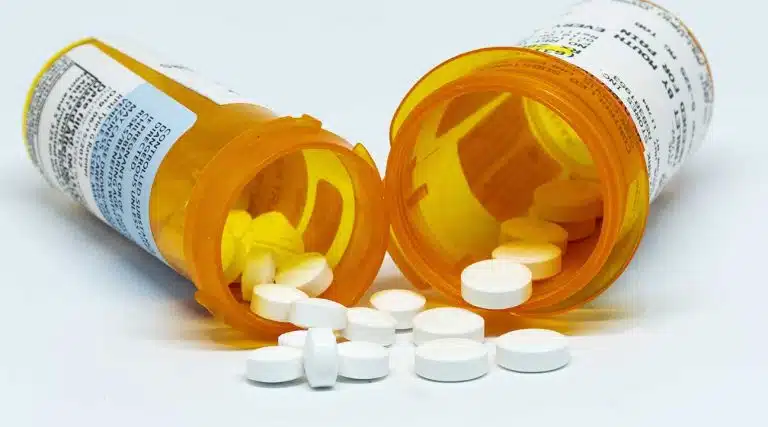Vicodin Vs. Percocet | Differences, Strengths, Side Effects, & Abuse Potential

Vicodin and Percocet are two of the most popular prescription drugs that can treat chronic pain as well as short-term pain.
Both painkillers can work well when taken as prescribed, but both have a high potential for abuse and addiction. However, they differ in terms of ingredients, side effects, and strengths.
What Is Vicodin?
Vicodin is a combination drug that contains hydrocodone and acetaminophen.
Acetaminophen is a non-opioid analgesic (pain reliever) and fever reducer. When not combined with other drugs, acetaminophen is often sold over-the-counter as Tylenol.
Hydrocodone is an opioid analgesic. Opioids are powerful pain relief drugs that change the way the brain and central nervous system respond to moderate to severe pain.
Common side effects of Vicodin include:
- drowsiness
- anxiety
- mood changes
- constipation
- trouble urinating
- lightheadedness
- dry throat
- itching and/or rash
- narrow pupils
Vicodin Strengths
Vicodin is available as a tablet in the following strengths:
- 5 mg / 300 mg (5 mg of hydrocodone and 300 mg of acetaminophen)
- 7.5 mg / 300 mg
- 10 mg / 300 mg
It’s typically taken every four to six hours as needed.
What Is Percocet?
As with Vicodin, Percocet is a combination drug that features acetaminophen. However, instead of hydrocodone, its other main ingredient is oxycodone.
Like hydrocodone, oxycodone is an opioid analgesic.
Common side effects of Percocet include:
- stomach pain
- headache
- dry mouth
- flushing
In addition, like Vicodin, Percocet often causes drowsiness, anxiety, and mood changes.
Percocet Strengths
Percocet is available as a tablet in the following strengths:
- 2.5 mg / 325 mg (2.5 mg of oxycodone and 325 mg of acetaminophen)
- 5 mg / 325 mg
- 7.5 mg / 325 mg
- 7.5 mg / 500 mg
- 10 mg / 325 mg
- 10 mg / 600 mg
Like Vicodin, it’s usually taken every four to six hours as needed.
Abuse Potential & Opioid Addiction
The United States Drug Enforcement Administration (DEA) classifies both Vicodin and Percocet as Schedule II controlled substances, which means they have a high potential for abuse and addiction.
This is because both drugs contain opioids, and opioids are highly addictive.
You’re more likely to become addicted to a prescription opioid medication if you abuse it. People abuse Vicodin and Percocet to feel euphoric or “high.”
Long-term use of Vicodin or Percocet, even as prescribed by a doctor, can also lead to addiction.
Warning Signs Of Opioid Addiction
People addicted to Vicodin or Percocet may:
- withdraw from family and friends
- neglect professional responsibilities
- visit several doctors to get multiple prescriptions of Vicodin or Percocet
- need increasingly higher doses of the drug over time to achieve the desired effects (also called “tolerance”)
- experience unpleasant withdrawal symptoms such as anxiety or sweating when trying to quit the drug (also called “physical dependency”)
Opioid Addiction Treatment Options
If you or someone you love is addicted to Vicodin or Percocet, it’s important to seek professional medical advice at a substance abuse treatment center.
When left untreated, the addiction could lead to an overdose, which may be fatal.
Most people who struggle with opioid addictions require medical detox followed by medication-assisted treatment.
Medical Detox
During medical detox, a team of health care providers will closely monitor your physical and mental health as they gradually reduce your dosage of Vicodin or Percocet.
This process, which is known as tapering, is less likely to cause withdrawal symptoms compared to quitting cold turkey.
Medication-Assisted Treatment (MAT)
During MAT, your treatment providers help you recover from opioid addiction by prescribing medications like buprenorphine, methadone, and naltrexone. These medications can make recovery easier by reducing cravings and easing withdrawal symptoms.
MAT also gives you access to other recovery services such as:
- behavioral therapy, in which a mental health counselor will help you identify triggers for drug abuse and develop healthier behaviors
- psychiatry, in case you need medications such as antidepressants or anti-anxiety medications to manage underlying mental health conditions
- peer support groups, where you can connect with other people who are recovering from addictions to pain medications and other substances
To learn more about treatment options for Vicodin or Percocet addiction, reach out to an Ark Behavioral Health specialist today.
Written by Ark Behavioral Health Editorial Team
©2024 Ark National Holdings, LLC. | All Rights Reserved.
This page does not provide medical advice.
U.S. Drug Enforcement Administration (DEA) - Drug Scheduling
U.S. Food and Drug Administration (FDA) - PERCOCET® (Oxycodone and Acetaminophen Tablets, USP)
U.S. National Library of Medicine: MedlinePlus - Acetaminophen
U.S. National Library of Medicine: MedlinePlus - Hydrocodone Combination Products
U.S. National Library of Medicine: MedlinePlus - Oxycodone

Questions About Treatment?
Ark Behavioral Health offers 100% confidential substance abuse assessment and treatment placement tailored to your individual needs. Achieve long-term recovery.
100% confidential. We respect your privacy.
Prefer Texting?
Our friendly support team is here to chat 24/7. Opt out any time.







 Learn More
Learn More








